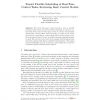Free Online Productivity Tools
i2Speak
i2Symbol
i2OCR
iTex2Img
iWeb2Print
iWeb2Shot
i2Type
iPdf2Split
iPdf2Merge
i2Bopomofo
i2Arabic
i2Style
i2Image
i2PDF
iLatex2Rtf
Sci2ools
HYBRID
2007
Springer
2007
Springer
Toward Flexible Scheduling of Real-Time Control Tasks: Reviewing Basic Control Models
We review state-space control models in order to identify timing properties that can favour flexible scheduling of real-time control tasks. First, from the state-space model of a linear time-invariant discrete-time control system with time delay, we derive a new model that involves computing the control signal with a predicted state vector at the actuation instant. Second, by allowing irregular sampling instants, we show that the new model only forces a single synchronization point (actuation instant) while having a feasible implementation. This augurs better schedulability for a set of real-time control tasks, and can provide robustness against scheduling induced jitters.
Actuation Instant | HYBRID 2007 | Hybrid Systems | Real-time Control Tasks | Time-invariant Discrete-time Control |
| Added | 07 Jun 2010 |
| Updated | 07 Jun 2010 |
| Type | Conference |
| Year | 2007 |
| Where | HYBRID |
| Authors | Pau Martí, Manel Velasco |
Comments (0)

